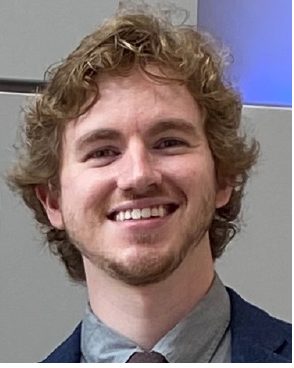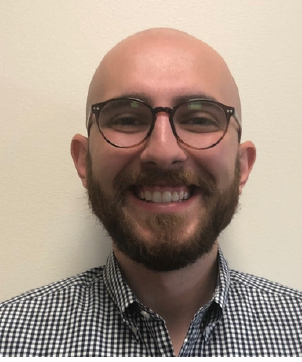Research Cafe: Shawn Rumrill & Sergej Grunevski
Event Description
Research Cafe: March 8, 2023
3:00 - 4:00pm
679 Hoes Lane, Piscataway, NJ 08854 (Room #10)
Center for Advanced Biotech and Medicine, Busch Campus
Zoom option available.
~Snacks & coffee provided!~
Register to attend in person or on Zoom.
Students, faculty, and staff are invited to join the School of Graduate Studies as we enjoy, dialogue about, and learn from two fantastic graduate students -- Shawn Rumrill (Ph.D. student, Chemistry & Chemical Biology) and Sergej Grunevski (Ph.D. student, Cognitive Psychology) -- who will share their research in a friendly and low-stakes setting. Learn more about the presenters and their presentations below!
---
1.) "Structural implications of a second strand HIV-1 reverse transcription initiation complex +/- NNRTI for slow nucleotide incorporation and high sensitivity to NNRTI inhibition" by Shawn Rumrill

Abstract: A major target of antiretroviral therapy is the reverse transcriptase (RT) enzyme, which converts viral RNA into the DNA provirus, with nearly 50% of FDA approved HIV treatments targeting RT. Of these, non-nucleoside reverse transcriptase inhibitors (NNRTIs) are potent allosteric inhibitors of RT, but questions remain open about where and how they act in different stages of the viral lifecycle and reverse transcription. Biochemical studies have shown that plus-strand initiation of reverse transcription (initiating “second strand” DNA synthesis) is particularly sensitive to inhibition by NNRTIs, with more modest inhibition occurring in minus-strand synthesis. As such, our work investigates the structural features of a simplified plus-strand RT initiation complex (+miniRTIC) with and without an NNRTI (rilpivirine) to explore potential mechanisms that underlie these biochemical observations. Accordingly, we determined the first structure of HIV-1 RT with a DNA template and a polypurine tract RNA primer, representing the +0 state of plus-strand initiation. These structures provide new insights into the initiation state of RT, whereby the NNIBP more closely resembles an NNRTI-bound state, even in the absence of NNRTI, thus explaining increased susceptibility to inhibition. Further understanding of subsequent incorporation states may reveal new avenues for targeted therapy development.
Presenter Bio: Shawn Rumrill is a fifth-year Ph.D. candidate in the Department of Chemistry and Chemical Biology. Here, he uses biophysical techniques to understand the structure, function, and mechanisms of HIV and other proteins related to human health and disease. Outside of research, Shawn has a history of student involvement and leadership in organizations and student worker positions, include the Rutgers Graduate Student Association.
2.) "The dynamics of craving and willingness-to-pay for drugs and food in daily life" by Sergej Grunevski

Abstract: Craving refers to the intense desire for a particular substance or activity. Many people experience healthy cravings for food and snacks, whereas others report excessively high craving for drugs that predisposes them to relapse. Recent laboratory studies show that craving may bias behavior by influencing subjective value: people are willing to pay more for craved items during the momentary state of craving. The purpose of the current study was to extend these findings outside the lab by repeatedly surveying daily craving and willingness-to-pay for drugs and snack foods via smartphones as healthy people and people with opioid use disorder engaged in their everyday lives. In this talk, I will discuss similarities and differences between person-level and moment (day)-level experiences of craving, as well as the relationship between craving and willingness-to-pay within and across commodities. Overall, the purpose of our work is to understand the timescale of association between craving and subjective value for drugs and food, how craving for a specific commodity may influence willingness-to-pay for another commodity, how these processes are influenced by drug use, exposure to drug cues, and mood, and how predictive they may be of future relapse.
Presenter Bio: Sergej Grunevski is a first-year Ph.D. student in Cognitive Psychology at Rutgers University-New Brunswick. His primary graduate mentor is Dr. Anna Konova, Assistant Professor of Psychiatry, whose main research focus is addiction & decision neuroscience. Prior to coming to Rutgers, Sergej received his B.S. in Behavioral Neuroscience at the University of Kansas and then worked as a research coordinator for three years at the Cofrin Logan Center for Addiction Research and Treatment under Drs. Richard Yi and Tim Pleskac.
About Research Cafe
Research Café brings together the entire graduate student community of Rutgers University-New Brunswick/Piscataway campus to strengthen scholarly literacy and interdisciplinary research communication by providing a platform for budding researchers to connect, share their in-progress research or scholarship, and benefit from peer feedback in a friendly and low-stakes setting.
Research Café is a monthly, one-hour event to occur at rotating locations across the Rutgers New Brunswick/Piscataway campus (a Zoom option will be available, too). Each event will feature:
- Presentations (10-12 min. each) from two graduate students from across disciplinary areas ranging from engineering and biology to history and anthropology.
- A Q&A dialogue with peers and attendees.
- Conversational time over refreshments and snacks.
Sign up to attend in person or on Zoom at https://grad.rutgers.edu/research-cafe.
---
Questions? Contact the program coordinators:
Sonal Gahlawat at sg1389@scarletmail.rutgers.edu, Briana Bivens at bb770@grad.rutgers.edu, and Ramazan Güngör at rg835@grad.rutgers.edu.